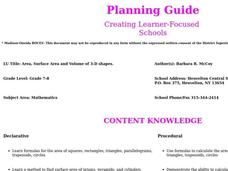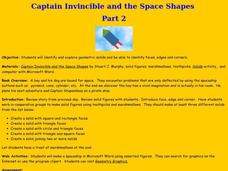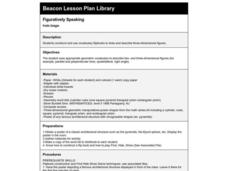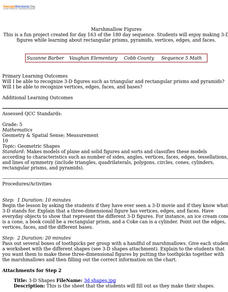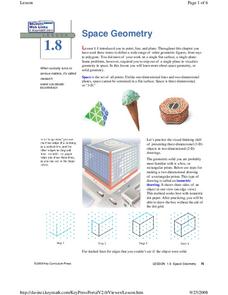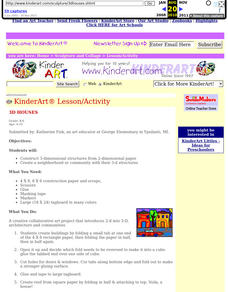Curated OER
Area, Surface Area and Volume of 3-D Shapes
Math whizzes examine the relationship between area and volume and the relationship between a 3-D shape and its surface area. Following discussion and practice, pupils participate in a project in which they design packaging for a new...
Curated OER
Spacemobiles
Aspiring astronauts construct a space vehicle using cylinders, cones, spheres, and rectangular prisms. This is an engaging method of learning about three-dimensional shapes. Note that the word cylinder is constantly misspelled in the...
Curated OER
Geometry, Shapes and Public Sculpture
Young scholars explore characteristics of geometric shapes. They observe geometric shapes and forms in public sculpture. Students create a unique sculpture of their own using basic three dimensional shapes. Additional cross curriculum...
Curated OER
Net "Working"
Upper elementary and middle schoolers explore the properties of various polygons. They use video, resource links, and engage in hands-on activities in order to construct geometric nets. This fine plan should lead to increased...
Curated OER
Using Geometric Shapes in Architecture
Third graders identify two and three dimensional shapes used in architectural designs by viewing images on the Internet. For this geometry lesson, 3rd graders create their own building designs and identify the geometric shapes that...
Curated OER
Captain Invincible and the Space Shapes
Young scholars recognize the features of geometric shapes. In this geometric shapes lesson plan, students listen to Captain Invincible and the Space Shapes. Young scholars create solid figures with marshmallows and...
Curated OER
I've Seen That Shape Before
Students identify geometric solids. In this shape lesson plan, students explore the characteristics of geometric solids. They locate pictures of shapes on the internet, and identify the shapes. Students draw pictures of...
Curated OER
Marshmallow Geometry
In this three-dimensional shapes geometry lesson, learners identify geometric solids and name their properties. They define "face," "edge," and "vertex," and construct geometric solids using marshmallows as vertices and toothpicks as edges.
Curated OER
Figuratively Speaking
Third graders construct and use vocabulary flipbooks to draw and describe three-dimensional figures. They utilize worksheets and access websites imbedded in this plan which help them construct their books.
Curated OER
Marshmallow Figures
Students enjoy making 3-D figures while learning about rectangular prisms, pyramids, vertices, edges, and faces. After a lecture/demo, students use marshmallows, toothpicks and a worksheet imbedded in this lesson to create 3 dimensional...
Curated OER
Space Geometry
Students explore points, lines and planes as it relates to geometry. In this geometry lesson, students analyze space and explain wy it is 3-D and not flat or 2-D. They solve problems involving volume and 3-D shapes.
Curated OER
Investigation-On the Surface
Students compute the surface area of 3 geometric solids to determine the shape of package that would require the least amount of paper to wrap. In this geometry lesson, students work on a two-question assessment embedded in the plan. The...
Curated OER
Color Me Square
Second graders identify and describe basic geometric solids. Working as a class, 2nd graders describe geometric solids using the proper vocabulary and counting faces, bases, corners, and edges. In pairs, students use a computer drawing...
Curated OER
3D Houses
Students construct 3-dimensional structures from 2-dimensional paper. They design and compile their structures to resemble a neighborhood community.
